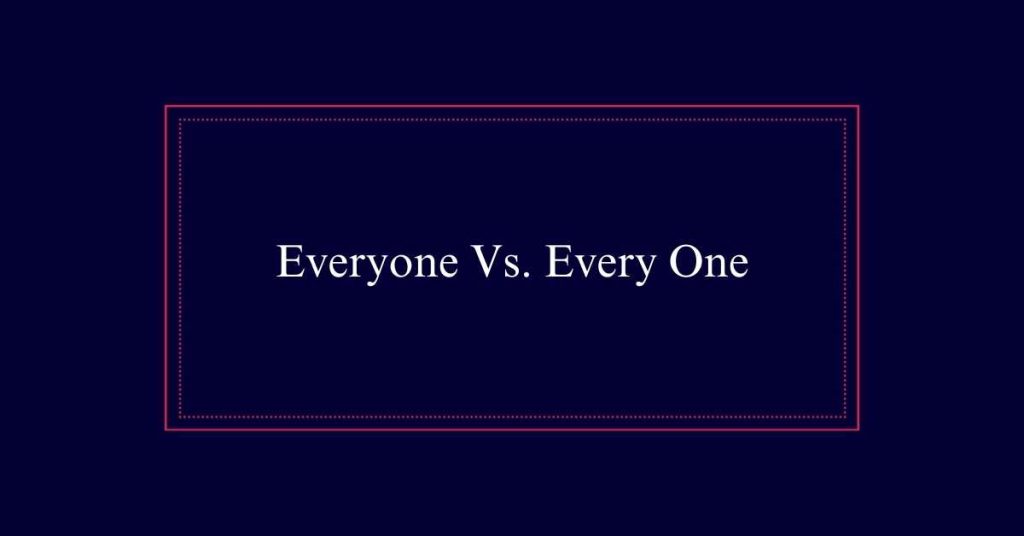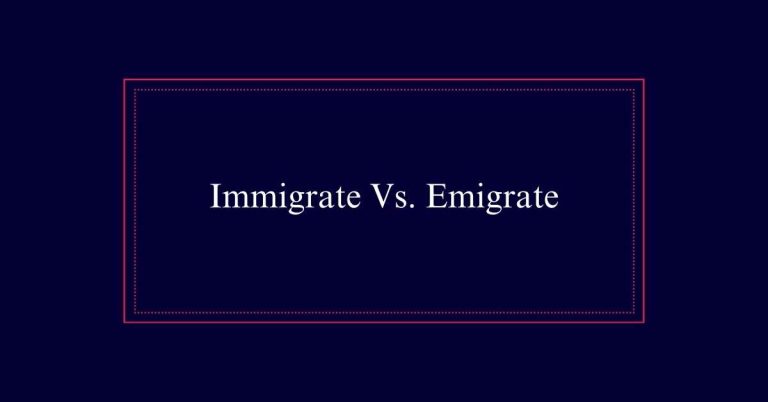Everyone Vs. Every One
‘Everyone’ refers to all people in a group collectively and is interchangeable with ‘everybody’. It is used for general and inclusive statements. On the other hand, ‘every one’ emphasizes each individual member within a group. It highlights uniqueness and specificity. Understanding the difference enhances clarity in communication. ‘Everyone’ helps convey broad, collective meanings, while ‘every one’ emphasizes individual members.
Definition of ‘Everyone’
‘Everyone’ refers to all people in a given group. It is a term used to denote a collective group without focusing on individual members. For instance, saying ‘Everyone enjoyed the concert’ indicates that all attendees had a good time.
‘Everyone’ is interchangeable with ‘everybody,’ and both can be used to refer to groups in general terms. This word simplifies communication when addressing a broad audience. In writing, using ‘everyone’ helps create a sense of inclusivity and general consensus.
Its usage is common in both formal and informal contexts, making it a versatile term.
Definition of ‘Every One’
‘Every one’ refers to each individual member within a group. This term is used to emphasize the uniqueness and individuality of each person in the group.
Unlike ‘everyone,’ which addresses the group as a whole, ‘every one’ focuses on specific individuals. This distinction is especially clear when ‘every one’ is followed by an ‘of’ phrase, such as in ‘every one of the books.’ This usage highlights the importance of each item or person separately.
General Group Reference
When referring to a group as a whole, ‘everyone’ is the appropriate term. This word indicates all members of a group collectively. It is used when the focus is on the group in general, rather than on individuals within it.
For instance, ‘Everyone in the room applauded.’ Here, ‘everyone’ includes all people present, without singling out any person. This general reference helps in conveying a broad, inclusive meaning.
By using ‘everyone’, the emphasis remains on the collective action or state of the group. This usage makes sure that the readers understand the group dynamic without focusing on individual contributions.

Individual Emphasis
To highlight each individual within a group, use the term ‘every one’. This term is particularly useful when you want to emphasize the individuality of each member in a group. Unlike ‘everyone’, which refers to the group collectively, ‘every one’ focuses on each person separately. For instance, consider the sentence, ‘Every one of the employees received a bonus.’ Here, the emphasis is on each employee individually.
Below is a table to illustrate the difference:
| Term | Usage Example | Emphasis |
|---|---|---|
| Everyone | Everyone attended the meeting. | Collective group |
| Every one | Every one of the students passed. | Individual members |
| Everyone | Everyone enjoyed the performance. | General enjoyment |
| Every one | Every one of the cakes was delicious. | Specific individual objects |
Interchangeability With ‘Everybody’
In addition to understanding the individual emphasis, it’s important to know that ‘everyone’ can be seamlessly replaced with ‘everybody’ in most contexts. Both terms serve as collective pronouns referring to all people in a group.
For example, ‘Everyone enjoyed the movie’ can easily be rephrased as ‘Everybody enjoyed the movie’ without changing the meaning. This interchangeability offers flexibility in writing and speaking, allowing for variations in tone or style.
However, it’s essential to recognize that this does not apply to ‘every one,’ which emphasizes each individual within a group.
Usage in Phrases
Usage in phrases involving ‘everyone’ and ‘every one’ often hinges on the specific context and emphasis intended. Everyone’ is commonly used in general statements, such as ‘Everyone is welcome to attend the meeting.’ It implies all people in a certain group.
On the other hand, ‘every one’ is used to emphasize individual members within a group. For example, ‘Every one of the team members contributed to the project’ highlights each person’s participation.
Contextual Considerations
When deciding between ‘everyone’ and ‘every one,’ context plays a pivotal role in ensuring accurate communication.
The term ‘everyone’ is used when referring to a broad group collectively. For example, ‘Everyone at the conference was engaged.’ Here, the word encompasses all attendees as a single unit.
Conversely, ‘every one’ is used to highlight each individual within a group. An example would be, ‘Every one of the participants received a certificate.’ This sentence emphasizes each person separately.
Enhancing Writing Clarity
Clarity in writing can be greatly enhanced by correctly distinguishing between ‘everyone’ and ‘every one’. Using these terms accurately guarantees that readers understand the intended meaning without confusion. ‘Everyone’ refers to all people in a group collectively, while ‘every one’ emphasizes each individual within the group. Misusing these can muddle the message, but proper usage promotes clear communication.
Here’s a quick comparison:
| Usage | Example | Definition |
|---|---|---|
| Everyone | ‘Everyone attended the meeting.’ | Refers to all people in the group |
| Every one | ‘Every one of the reports was checked.’ | Emphasizes each individual in the group |
| Everyone | ‘Everyone is welcome to join.’ | General reference to the whole group |






